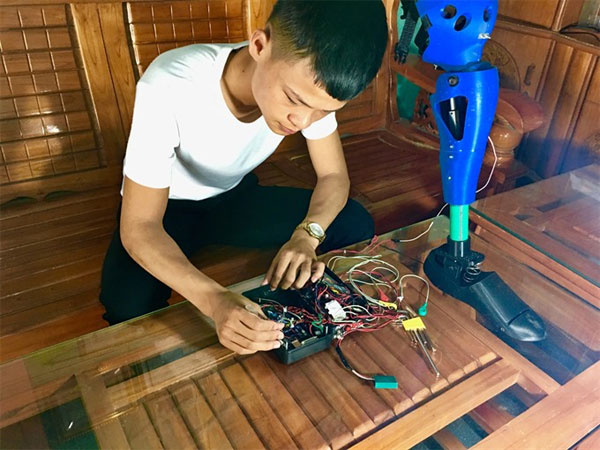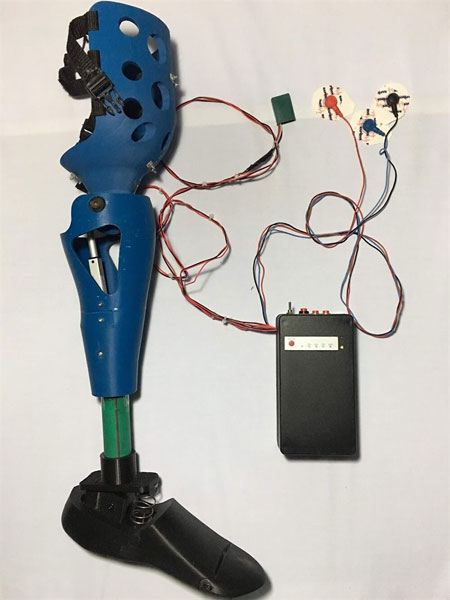For Nguyen Nhat Lam, a student at the Nguyen Hue High School in the central province of Ha Tinh, his favourite place at home is his desk, which is always covered in wires and electrical components.
For Nguyen Nhat Lam, a student at the Nguyen Hue High School in the central province of Ha Tinh, his favourite place at home is his desk, which is always covered in wires and electrical components.
 |
|
Workshop: Lam works on his robotic leg, which he hopes will provide a durable, effective and low-cost solution for disabled people. Photos courtesy of Nguyen Nhat Lam |
On this desk, he has conducted many experiments with the aim of creating products that are both helpful and affordable, particularly for the disabled.
Lam’s latest project, a robotic leg to help those who can’t walk, won third prize at the recent Viet Nam Science and Engineering Fair 2018. The prize is a deserving award for the great efforts and determination of the student from a rural district in Ha Tinh Province.
“I have had an interest in machines and electronic devices since I was small,” he recalls. “My house is far from the centre of the district, so I had few chances to come into contact with machinery.
“Fortunately, my uncle had a small workshop nearby. I spent days visiting and watching him work, inspiring me to make my first experiments with electrical items.”
His first experiment was conducted on his own bike when he was in 7th grade.
“I used to cycle about seven kilometres to school, every day. It was such a torture for me to cycle on hot sunny days,” he says.
“I wished I had an electric bike like other kids, but my family could not afford one. Then I came up with the idea of turning my old bike into an electric one.”
The 13-year-old boy embarked on the plan by collecting devices including control boards and batteries, which he attached to his bike.
After nearly a year of assembling and dismantling the components, Lam finally succeeded in creating his own electric set of wheels. From this first success, he continued to build on his knowledge of software and graphic design via the internet.
 |
|
Genius: The most important feature of Lam’s artificial leg is its automatic mode – when the user walks, the leg will bend or stretch accordingly. |
Lam also used his understanding about machinery to fix other villagers’ mobile phones and computers, which provided him with extra funds to purchase more components.
The idea of a low-cost and long-lasting prosthetic leg came to Lam when he saw disabled people living nearby who had to use expensive and unwieldy artificial legs to get around.
After drawing up his plans and receiving support from his school, he ordered the necessary electronic components from Canada and the US.
It took the young creator 16 months from drawing board to a working robotic leg. His device had two functions – a self-control mode with an electromyogram (EMG) sensor and an automatic mode with an MPU 6050 (magnetic pickup unit speed) sensor. The power is provided with lithium-ion polymer batteries.
“The most important feature of my artificial leg is its automatic mode – when the user walks, the leg will bend or stretch accordingly.
“It is also equipped with an emergency button and GPS system to alert family members when the user encounters problems. When the button is pressed, a message with the coordinates will be sent to relatives’ phones so that they can locate the disabled person,” Lam explains. “The total cost for my artificial leg is around VND15 million (US$645).”
There were many challenges and failures behind the development of the device, but it was the great support and encouragement of his teachers, friends and family that provided him with spiritual motivation.
“Particularly, teacher Pham Hong Duong has always been by my side, helping to order appropriate components on the internet, find disabled people to test the product and offer suggestions for improvements as well as technical support," he says.
 |
|
Proud: Lam was one of two students in Ha Tinh Province to receive honour awards granted for brilliant examples in the patriotic emulation movement by the provincial People’s Committee in June. |
“On the night before the provincial contest, the main engine burnt out, but we didn’t give up. We stayed awake until 2am to fix the problem. Finally we succeeded, winning first prize in the provincial creativity contest before entering the national one.
“It was such an honour for me to receive prestigious awards at both the provincial and national contests, which will motivate me for my future creations.”
However, due to a lack of finance and experience, Lam has not yet thought about registering a patent for his robotic leg or putting it into mass production. However, the young student hopes to realise these ambitions in the near future.
Lam’s head teacher, Hoang Thi Kim Oanh, could not hide her pride when talking about her creative student.
“What I admire most is his strong will and efforts to overcome all challenges to fulfill his passion. He has set a good example for every student to follow,” she says.
Before his robotic leg, Lam’s other project, a laser engraving machine, won second place in the Viet Nam Science and Engineering Fair in the 2016-2017 school year for its advanced features and high applicability.
He was also one of two students in Ha Tinh Province to receive honour awards granted for typical examples in the patriotism campaign by the provincial People’s Committee in June.
Thanks to his achievements, Lam has been admitted to the University of Engineering and Technology under the Viet Nam National University, which he believes will be the next step on his creative journey.





